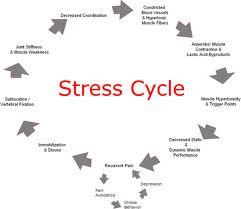How Does Stress Contribute to Heart Disease?
Medical researchers aren't sure exactly how stress increases the risk of heart disease. Stress itself might be a risk factor, or it could be that high levels of stress make other risk factors (such as high cholesterol or high blood pressure) worse. For example, if you are under stress, your blood pressure goes up, you may overeat, you may exercise less, and you may be more likely to smoke.
If stress itself is a risk factor for heart disease, it could be because chronic stress exposes your body to unhealthy, persistently elevated levels of stress hormones like adrenaline and cortisol. Studies also link stress to changes in the way blood clots, which increases the risk of heart attack.
What Are the Warning Signs of Stress?
When you are exposed to long periods of stress, your body gives warning signs that something is wrong. These physical, cognitive, emotional, and behavioral signs of stress should not be ignored. They tell you that you need to slow down. If you continue to be stressed and you don't give your body a break, you are likely to develop health problems. You could also worsen an existing illness.
Below are some common warning signs of stress.
Physical signs
Dizziness, general aches and pains, grinding teeth, clenched jaws, headaches, indigestion, muscle tension, difficulty sleeping, racing heart, ringing in the ears, stooped posture, sweaty palms, tiredness, exhaustion, trembling, weight gain or loss, upset stomach
Mental signs
Constant worry, difficulty making decisions, forgetfulness, inability to concentrate, lack of creativity, loss of sense of humor
Emotional signs
Anger, anxiety, crying, depression, feeling powerless, frequent mood swings, irritability, loneliness, negative thinking, nervousness, sadness
Behavioral signs
Bossiness, compulsive eating, critical attitude of others, explosive actions, frequent job changes, impulsive actions, increased use of alcohol or drugs, withdrawal from relationships or social situations
How Can I Cope With Stress?
Here are some tips for coping with stress:
Eat and drink sensibly Abusing alcohol and food may seem to reduce stress, but it actually adds to it.
Assert yourself.You do not have to meet others' expectations or demands. It's OK to say "no." Remember, being assertive allows you to stand up for your rights and beliefs while respecting those of others.
Stop smoking. Aside from the obvious health risks of cigarettes, nicotine acts as a stimulant and brings on more stress symptoms.
Exercise regularly. Choose non-competitive exercise and set reasonable goals. Aerobic exercise has been shown to release endorphins (natural substances that help you feel better and maintain a positive attitude.)
Relax every day.Choose from a variety of different techniques (see below).
Take responsibility. Control what you can and leave behind what you cannot control.
Reduce causes of stress. Many people find life is filled with too many demands and too little time. For the most part, these demands are ones we have chosen. Effective time-management skills involve asking for help when appropriate, setting priorities, pacing yourself, and taking time out for yourself.
Examine your values and live by them. The more your actions reflect your beliefs, the better you will feel, no matter how busy your life is.
Set realistic goals and expectations. It's OK, and healthy, to realize you cannot be 100% successful at everything all at once.
Sell yourself to yourself When you are feeling overwhelmed, remind yourself of what you do well. Have a healthy sense of self-esteem.
Get enough rest. Even with proper diet and exercise, you can't fight stress effectively without rest.You need time to recover from exercise and stressful events. The time you spend resting should be long enough to relax your mind as well as your body. Some people find that taking a nap in the middle of the day helps them reduce stress.

1 comments:
Wow....Nice Article....Thanks
Post a Comment
Note: Only a member of this blog may post a comment.